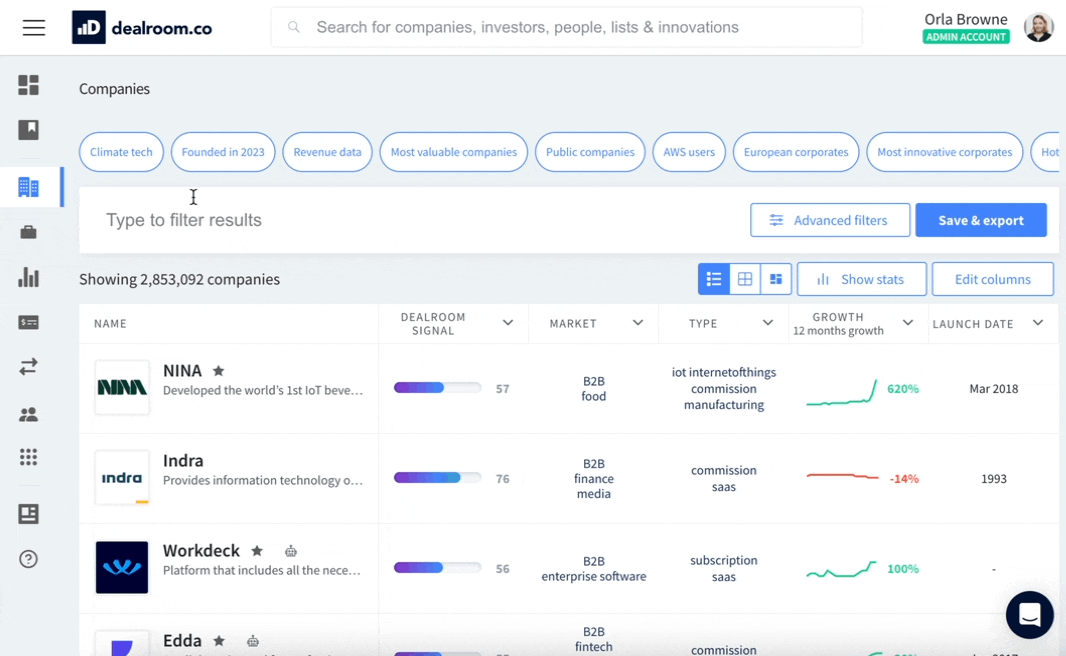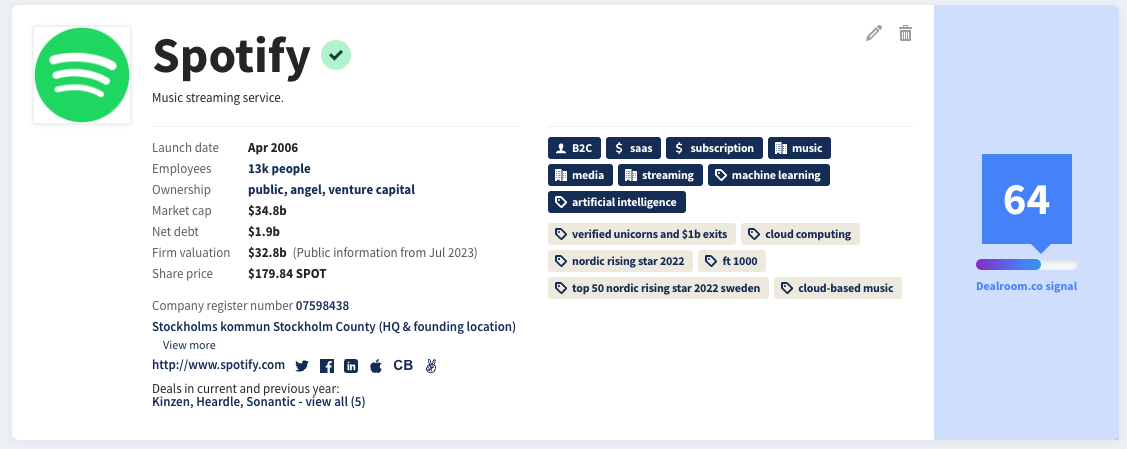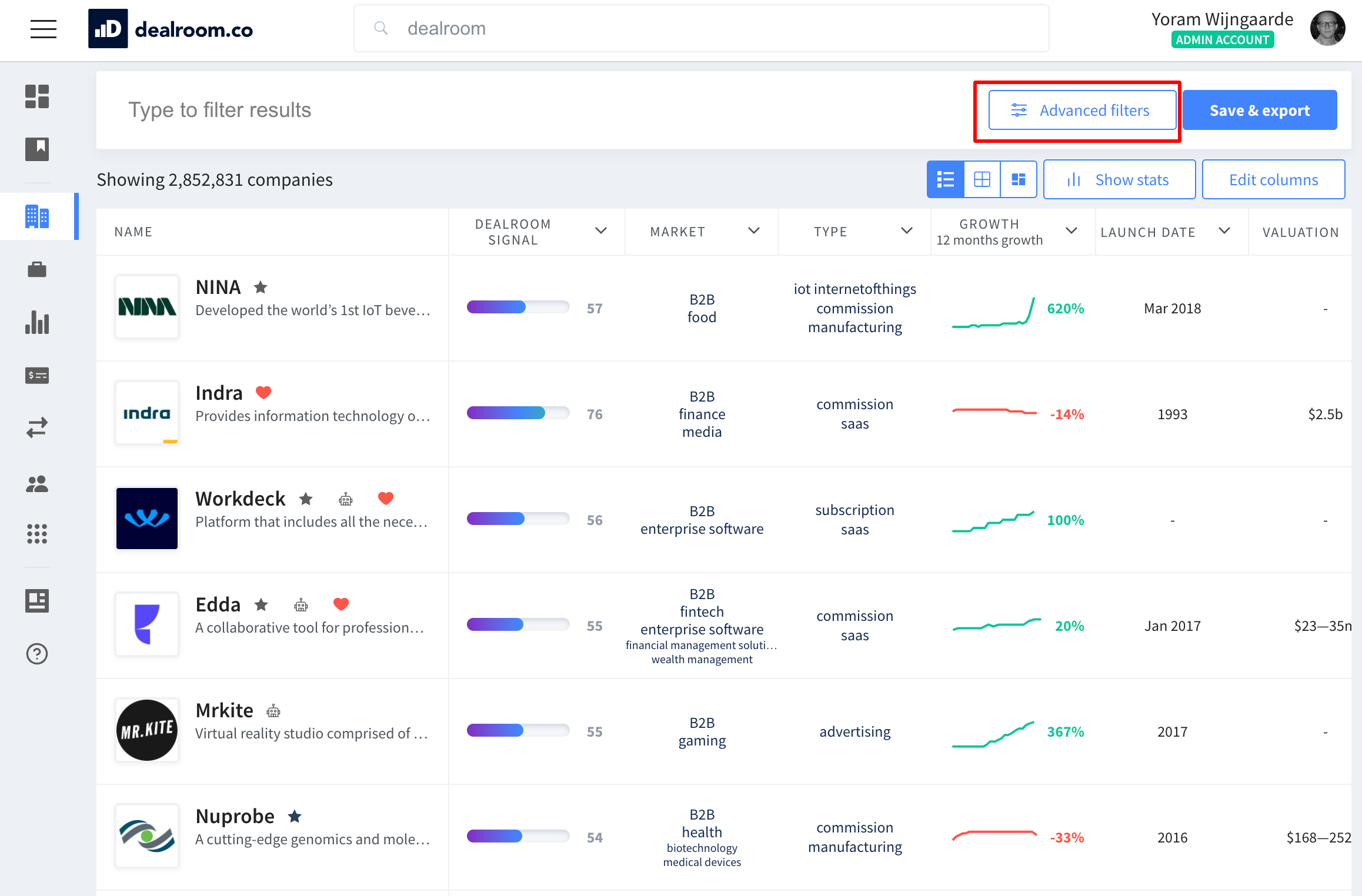Proprietary tech taxonomy
Introduction
Dealroom’s Intelligence Unit has developed a proprietary technology taxonomy that acts as a foundation and helps you navigate existing and emerging technologies. In tech, there are lots of nuances, and therefore we encourage you to talk to discuss your specific objectives so that we can ensure your success. Just open the chat (bottom right) or contact us.
Base structure
The proprietary technology taxonomy has the following base structure:
To learn how it all works, go to the Getting Started section.
Soft hierarchy
You can use the filters individually or in combination. For example, when you combine B2B, SaaS, and Fintech, the platform will show you companies that meet all three criteria.
There is a soft hierarchy baked into the structure. For instance, SaaS is more often B2B, while eCommerce & Marketplaces is more often B2C; but you can also search for B2C SaaS or B2B Marketplaces. The treemap below allows you to get a feel for the hierarchy and occurrence of combinations in the startup ecosystem.
Spotify example
For example, Spotify has the following combinations:
- Client focus: B2C
- Income stream: Subscription
- Business model: SaaS
- Industry: Media
- Sub-industry: Streaming
- Technologies: Machine Learning and Artificial Intelligence
- Grey tags: verified unicorns and $1b exits, cloud computing, nordic rising star 2022, ft 1000, top 50 nordic rising star 2022 sweden, cloud-based music.
As you can see, grey tags have various use cases. You can click on each tag in the company profile, to see more results.
Getting started
You can explore taxonomy directly on the platform, via our API, or in consultation with our Intelligence Unit. Below focuses on the platform.
Advanced search
A good way to start using these filters on the platform is by visiting the platform, going to the companies table (app.dealroom.co/companies) and clicking on “Advanced Filters”. You’ll need a Premium or Premium Trial account for this. Just open the chat (bottom right) or contact us if you would like to set this up (best if you create a free account first).
Query bar
Once you get the hang of available filters, the query bar often becomes a quicker way to perform your queries. The below GIF shows how this works.

Keywords
In addition to the above taxonomy, which provides a structure, you can also type anything in the query bar and hit enter. This has the benefit that your search term isn’t dependent on whether or not we have manually curated the segment. Keywords work best to use only one word or a string of two words and choose specific industry terms such as psychedelic, neuromorphic, generative ai, and quantum computing.
Keyword search will return any company that has this word or (word string) in its description. This makes it very useful for discovery. If you want to know exact statistics, we recommend not to use Keywords and instead tags, and to get in touch with us.
Find emerging tech
Visualizations
To find out which categories are “hot”, it usually helps to look at some combination of growth and size. The below scatter plot does exactly that, shown on a log scale for both axes. The plot highlights many emerging categories, such as Carbon Tracking & Offset and Generative AI.
Rankings
Another way to achieve this is by creating a combined ranking (a composite of growth and size). The below table shows categories using such a method.
Impact and sustainability
SDGs
The UN has created 17 Sustainable Development Goals (SDGs), and these are applied to startups that are directly tackling them as part of their core business.
The 17 SDGs are No Poverty, Zero Hunger, Good Health and Well-being, Quality Education, Gender Equality, Clean Water and Sanitation, Affordable and Clean Energy, Decent Work and Economic Growth, Industry, Innovation, and Infrastructure, Reduced Inequalities, Sustainable Cities and Communities, Responsible Consumption and Production, Climate Action, Life Below Water, Life on Land, Peace, Justice, and Strong Institutions, Partnerships.
Proprietary Climate Taxonomy
Climate tech is applied to startups tackling the environmentally related SDGs, such as Affordable and Clean Energy, Climate Action, Life Below Water, Life on Land, etc. But in addition to that, we have applied our own set of tags, such as Carbon Removal. You can learn more about these in our Climate Tech Guide.
Deep tech
Deep, frontier, hard tech
These are containers that contain a variety of segments. We encourage you to contact us to discuss your objectives in these areas. Also, see the European Deep Tech Guide.
Deep tech includes any technology that is based on tangible engineering innovation or scientific advances and discoveries applied for the first time as a product, often aiming to solve society’s biggest issues.
| Deep Tech | We have created a container tag Deep Tech which includes companies in several areas such as future of computing (e.g. quantum computing, photonics tech, ai chips), novel energy (e.g. nuclear fusion, hydrogen, solid-state batteries, carbon removal), novel ai (e.g. generative AI, explainable and responsible AI, autonomous systems), space tech, synthetic biology and much more. |
|---|---|
| Frontier Tech | Frontier tech is broader, also including companies that are using these novel technologies as applications, without developing the R&D on them. Deep Tech, plus: + VR, AR, blockchain, autonomous tech + climate tech + robotics, space, semiconductors |
| Hard Tech | Frontier Tech, plus: + Health, Energy + hardware and manufacturing |
Patents
We've partnered with cipher.ai to bring patent intelligence to Dealroom, along with their universal technology taxonomy, the leading classification for innovation patent filings, helping create a 360-degree understanding of innovation ecosystems and providing a deeper insight into the startups themselves.
The nine super-classes and sub-classes are listed below.
| Electrical | ADC & DAC, Amplifiers, Audio transducers, Cables, Capacitors, Connections, Displays, Inductors, Lighting, Motors, PCBs, Resistors, Switches |
|---|---|
| Energy | Batteries, Fuel cells, Gas turbines, Hydroelectric, Nuclear, Photovoltaics, Piston engines, Wind turbines |
| Information | 3D printing, AR & VR, Blockchain, Engineering software, Gaming, Image processing, Machine learning, Printing, Scanning, Security, Social media, Speech recognition, Storage, Streaming, UI, eCommerce |
| Life sciences | Absorbent materials, Biological assays, Cleaning, Cosmetics, Drug administration, Food & drink, Immunogenics, Industrial microbiology, Infection & disease therapy, Molecular oncology, Pest control, Plant breeding, Stem cells, Surgical catheters, Surgical implants, Surgical robotics, Tobacco |
| Materials | Chemicals, Coatings, Fabrics, Gases, Glass, Insulation, Liquid processing, Packaging, Polymers |
| Mechanical | Airbags, Bearings, Clutches & brakes, Conveyors, Cutting tools, Doors, Drills, Fasteners, Furniture, Haptics, Heat exchangers, Hinges, Locks, Molding, Munitions, Pipes, Pumps, Robotics, Steering, Suspension, Transmissions, Valves, Wheels & tires |
| Semiconductors | Lithography, Memory, Processors, Substrates, Transistors |
| Sensors & optics | Biometric sensors, Fluid sensors, Gaze sensors, Image sensors, Infrared sensors, Lasers, Lenses, Lidar, Magnetic sensors, Motion sensors, Pressure sensors, Projection, Radar sensors, Radiographic sensors, Spectrometry sensors, Temperature sensors, Touch sensors, Ultrasound sensors |
| Telecommunication | Antennae, Location & satellite, Optical networks, Wired networks, Wireless networks |
Jobs and skills
On Dealroom you can also filter companies by the type of job openings and tech stack.
Job openings
You can filter companies by the type of jobs they are recruiting for. This can be useful for job seekers. Say you want to find Backend Development jobs at Climate x Deep Tech companies.
Below is a list of job types.
| Sales & Marketing jobs | Sales, Marketing & Communication, CSM & Support, Business Development |
|---|---|
| Tech & Product jobs | Backend Development, Data Science & Engineering, Full-stack Development, Frontend Development, DevOps, Android Development, iOS Development, Design |
| General jobs | Human Resources, Accounting, Project Management, Finance, Logistics, Business Intelligence, Legal |
Tech stack
You can filter companies by the specific tech used by the teams. For instance, these companies that use AWS. Talk to the Dealroom team to get more granular data on tech stack data.
Knowledge partners
We work closely with industry leaders to build out each area of categorization. For example:
- European Space Agency and Fondazione E. Amaldi on Space Tech
- Lakestar, Walden Catalyst, Intel Ignite, BCG on Deep Tech
- Impact City, 2150, Rockstart, Danske Bank on Climate Tech & Impact
- MTIP, Inkef, Speedinvest and EIT Health on Health and Biotech
- ABN AMRO Ventures on Fintech
- Mundi Ventures on Insurtech
- RockawayX on crypto
- UKRI on Battery tech
- Brighteye on Edtech
- Via ID on Mobility
- Five Seasons Ventures on Foodtech
- Adevinta Ventures on Marketplaces

